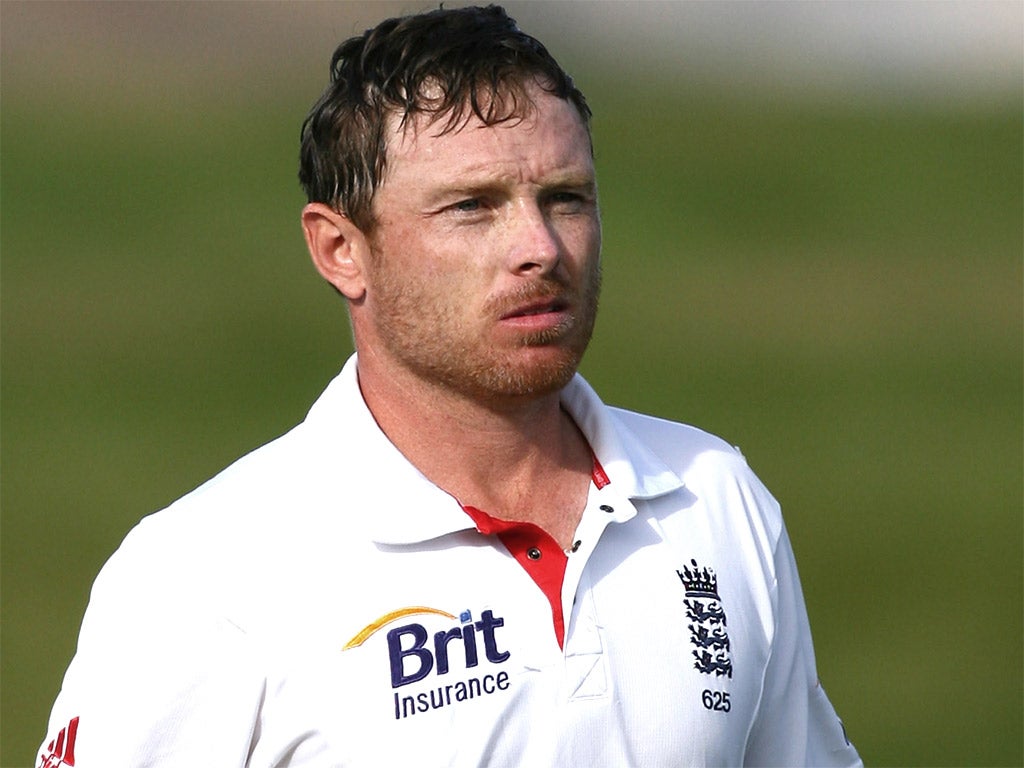Ian Bell: We must wage war on drugs
England batsman backs introduction of tests on hair samples to detect use of recreational substances

Ian Bell has called on the cricket authorities to pull out all the stops to prevent a repeat of the tragic circumstances of Tom Maynard’s death.
The England batsman has backed plans to increase drug testing in the sport after it emerged at an inquest on Tuesday that the former Surrey player had been a habitual cocaine user. Maynard had taken the substance as well as ecstasy, and had been drinking, on the day he was hit by a Tube train on a live rail near Wimbledon Park station in London last June.
“I would welcome testing for recreational drugs,” Bell said. “Other sports are doing it, so why not? It is important that whatever is put in place, what has happened never happens again. Hopefully, with things being put in place we can stop this happening in future.”
Bell heard news of the tragic circumstances after scoring a century for England in a warm-up game in New Zealand before the Test series. The coroner at Westminster, Dr Fiona Wilcox, called upon cricket and other sports to introduce hair testing to determine long-term drug habits and Bell backed the efforts of the England and Wales Cricket Board, which has said it will look into implementing out-of-competition tests for recreational drugs as early as next summer. Such samples hitherto have been screened only for performance-enhancing substances.
Angus Porter, chief executive of the Professional Cricketers’ Association, said of the coroner’s recommendation: “If you do hair sampling you are testing over an extended period. In Tom’s case the hair sample gave a three-and-a-half-month history. Therefore they are a more complete test than a urine test that might only look at what you have taken in the last 24 to 48 hours.”
Porter, however, was keen to stress that he did not believe cricket had a major drugs problem. “While Tom’s case is shocking I don’t think it is evidence of a widespread problem,” he said. “I think we can be fairly confident he was unusual in terms of the extent of his apparent addiction to recreational drugs, and reasonably confident there are not a lot of players out there who have got similar problems. We’re not complacent but I would say the problems in cricket are reflective of the problems in society as a whole.”
The ECB may also increase the amount of testing but Porter does not feel the governing body’s current policy had been misguided. “In the last five years we have only had one positive result out of hundreds of tests,” he said. “The data is overwhelmingly negative.” He stressed that the idea of increasing the amount of testing was not part of a witch-hunt, but would be designed to help players address their problems. “We should do it more from a pastoral, duty of care perspective. I would hate to think anybody was suggesting we should increase the amount of testing in order to punish people. Somebody taking recreational drugs is not trying to cheat. Their motives are quite different.”
The Maynard inquest has cast a shadow over England’s forthcoming Test series, which starts in Dunedin on Tuesday. Bell scored 127 not out in the tourists’ total of 357 for 7 against a New Zealand XI in Queenstown in the only warm-up game. He added 97 with the side’s latest sensation, Joe Root, who made 49. Root has secured the No 6 berth in the Tests, while Nick Compton will hang on to the opener’s slot he filled during the successful Test series in India before Christmas.
Bell had batted with Root in the fourth Test against India at Nagpur, Root’s debut, as they ensured the series-winning draw. “Joe is very cool and calm, that’s the impressive thing about him,” said Bell, looking forward to two Ashes series against Australia this year.
Meanwhile, MCC has put forward cricket’s claims for inclusion in the 2024 Olympics. The World Cricket committee, which acts as a complementary body to the International Cricket Council, is backing the inclusion of Twenty20 cricket in the Games, believing it could lead to “a potential boost” in the profile of the sport. Cricket would have to apply to be on the programme for future Olympics, but has passed through the first stage of selection, having received full Olympic recognition in 2010.
Subscribe to Independent Premium to bookmark this article
Want to bookmark your favourite articles and stories to read or reference later? Start your Independent Premium subscription today.

Join our commenting forum
Join thought-provoking conversations, follow other Independent readers and see their replies